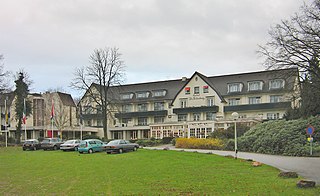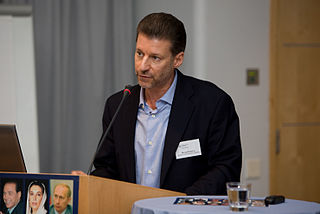Related Research Articles

Capitalism is an economic system based on the private ownership of the means of production and their operation for profit. Central characteristics of capitalism include capital accumulation, competitive markets, price systems, private property, property rights recognition, voluntary exchange, and wage labor. In a market economy, decision-making and investments are determined by owners of wealth, property, or ability to maneuver capital or production ability in capital and financial markets—whereas prices and the distribution of goods and services are mainly determined by competition in goods and services markets.

Corporatocracy is an economic, political and judicial system controlled by business corporations or corporate interests.
State capitalism is an economic system in which the state undertakes business and commercial economic activity and where the means of production are nationalized as state-owned enterprises. The definition can also include the state dominance of corporatized government agencies or of public companies such as publicly listed corporations in which the state has controlling shares.

The Bilderberg Meeting is an annual off-the-record forum established in 1954 to foster dialogue between Europe and North America. The group's agenda, originally to prevent another world war, is now defined as bolstering a consensus around free market Western capitalism and its interests around the globe. Participants include political leaders, experts, captains of industry, finance, academia, numbering between 120 and 150. Attendees are entitled to use information gained at meetings, but not attribute it to a named speaker. The group states that the purpose of this is to encourage candid debate while at the same time maintaining privacy, but critics from a wide range of viewpoints have called it into question, and it has provoked conspiracy theories from both the left and right.

The World Economic Forum (WEF) is an international non-governmental organization for public - private sector collaboration based in Cologny, Canton of Geneva, Switzerland. It was founded on 24 January 1971 by German engineer Klaus Schwab. The foundation, which is mostly funded by its 1,000 member companies – typically global enterprises with more than US$5 billion in turnover – as well as public subsidies, views its own mission as "improving the state of the world by engaging business, political, academic, and other leaders of society to shape global, regional, and industry agendas".

In sociology, the ruling class of a society is the social class who set and decide the political and economic agenda of society. In Marxist philosophy, the ruling class are the class who own the means of production in a given society and apply their cultural hegemony to determine and establish the dominant ideology of the society. They are also called the bourgeoisie. In the 21st century, the worldwide political economy established by globalization has created a transnational capitalist class who are not native to any one country.
In political science, the term polyarchy was used by Robert A. Dahl to describe a form of government in which power is invested in multiple people. It takes the form of neither a dictatorship nor a democracy. This form of government was first implemented in the United States and France and gradually adopted by other countries. Polyarchy is different from democracy, according to Dahl, because the fundamental democratic principle is "the continuing responsiveness of the government to the preferences of its citizens, considered as political equals" with unimpaired opportunities. A polyarchy is a form of government that has certain procedures that are necessary conditions for following the democratic principle.

World-systems theory is a multidisciplinary approach to world history and social change which emphasizes the world-system as the primary unit of social analysis.
Transnationalism is a research field and social phenomenon grown out of the heightened interconnectivity between people and the receding economic and social significance of boundaries among nation states.
The theory of state monopoly capitalism was initially a Marxist thesis popularised after World War II. Lenin had claimed in 1916 that World War I had transformed laissez-faire capitalism into monopoly capitalism, but he did not publish any extensive theory about the topic. The term refers to an environment where the state intervenes in the economy to protect larger monopolistic or oligopolistic businesses from threats. As conceived by Lenin in his pamphlet of the same name the theory aims to describe the final historical stage of capitalism, of which he believed the Imperialism of that time to be the highest expression.
The history of capitalism is diverse and the concept of capitalism has many debated roots. The history of the past 500 years is concerned with the development of capitalism in its various forms. Capital accumulated by a variety of methods, at a variety of scales, became associated with much variation in the concentration of wealth and economic power. Capitalism gradually became the dominant economic system throughout the world.
Transnational feminism refers to both a contemporary feminist paradigm and the corresponding activist movement. Both the theories and activist practices are concerned with how globalization and capitalism affect people across nations, races, genders, classes, and sexualities. This movement asks to critique the ideologies of traditional white, classist, western models of feminist practices from an intersectional approach and how these connect with labor, theoretical applications, and analytical practice on a geopolitical scale.

Criticism of capitalism is a critique of political economy that involves the rejection of, or dissatisfaction with the economic system of capitalism and its outcomes. Criticisms typically range from expressing disagreement with particular aspects or outcomes of capitalism to rejecting the principles of the capitalist system in its entirety. Criticism of capitalism is generally a left-wing to far-left stance on political economy.

Interlocking directorate refers to the practice of members of a corporate board of directors serving on the boards of multiple corporations. A person that sits on multiple boards is known as a multiple director. Two firms have a direct interlock if a director or executive of one firm is also a director of the other, and an indirect interlock if a director of each sits on the board of a third firm.
The capitalist state is the state, its functions and the form of organization it takes within capitalist socioeconomic systems. This concept is often used interchangeably with the concept of the modern state. Despite their common functions, there are many recognized differences in sociological characteristics among capitalist states.
Marxian class theory asserts that an individual's position within a class hierarchy is determined by their role in the production process, and argues that political and ideological consciousness is determined by class position. A class is those who share common economic interests, are conscious of those interests, and engage in collective action which advances those interests. Within Marxian class theory, the structure of the production process forms the basis of class construction.

William I. Robinson is an American professor of sociology at the University of California, Santa Barbara. His work focuses on political economy, globalization, Latin America and historical materialism. He is a member of the International Parliamentary and Civil Society Mission to Investigate the Political Transition in Iraq.
Angela Wigger is a political economist at the Political Science department at the Radboud University in the Netherlands.
William K. Carroll, also known as Bill Carroll, is a professor of Sociology at the University of Victoria, British Columbia, Canada. He is known for his work on interlocking directorates, corporate power and social movements.
Progressive capitalism is an approach to capitalism that seeks to improve the current neoliberal American capitalism that emerged in 1980. Progressive capitalism aims to improve economic results through four defining beliefs, namely the vital role businesses play in the economy by creating jobs, fostering innovation, enabling voluntary exchange, and providing competitive goods and services; the recognition of the important role public goods, public institutions, public services and public infrastructure play in supporting businesses including: research, schools, health care, social insurance, taxation, labor law and regulation of markets; the need for the state to be involved in design and oversight of the playing field; and the integration of social justice, stewardship of natural resources and responsibility to all major stakeholders. It is being advocated by Ro Khanna and Joseph Stiglitz.
References
- ↑ Robinson, William I. and Sprague, Jeb. (2018) . "The Transnational Capitalist Class." In Mark Juergensmeyer, Manfred Steger, Saskia Sassen, and Victor Faesse, Eds., The Oxford Handbook of Global Studies (Oxford, UK: Oxford University Press), P. 309-327.
- ↑ Robinson, William I. (2003) Transnational Conflicts: Central America, Social Change and Globalization. Verso Books, p. 39.
- ↑ Robinson, William I; Jerry Harris (Spring 2000). "Towards a global ruling class? Globalization and the transnational capitalist class". Science & Society. 64: 11–54.
- 1 2 Sklair, Leslie (August 1, 1995). Sociology of the Global System (2nd ed.). The Johns Hopkins University Press. pp. 352. ISBN 978-0801852114.
- ↑ Sklair, Leslie (May 2002). "Democracy and the Transnational Capitalist Class." The Annals, 581(1): 144-157, American Academy of Political and Social Science.
- ↑ Timothy Garton Ash. Davos man's death wish Archived 21 August 2008 at the Wayback Machine , The Guardian , 3 February 2005
- ↑ Samuel Huntington. "Dead Souls: The Denationalization of the American Elite" Archived 14 September 2016 at the Wayback Machine , The National Interest , Spring 2004
- ↑ Ian Richardson (31 May 2012). "Chantilly Laced: Holding Bilderberg and the Transnational Policy Elite to Account". Huffington Post. Retrieved 21 September 2015.